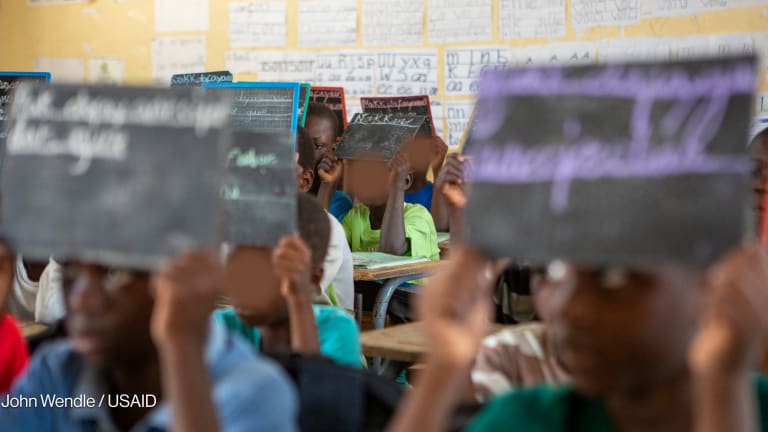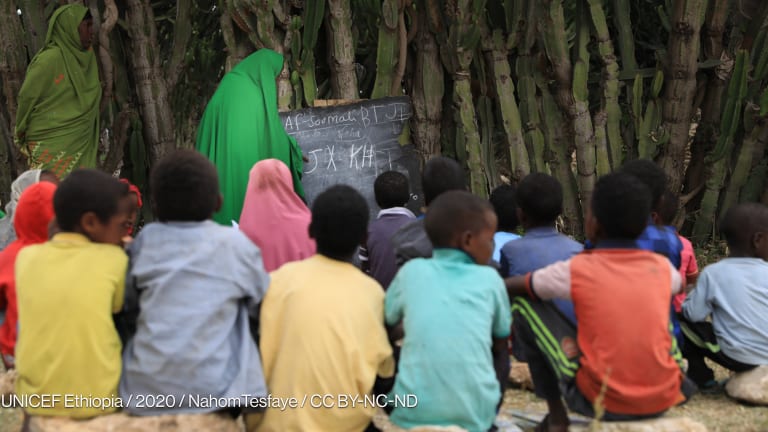Kenya's educators struggle with rollout of competency-based curriculum
Many in the global education community are advocating a shift to competency-based learning. But Kenya's attempt to roll out a new curriculum demonstrates the challenges that many countries are facing.
NAIROBI — In a shift away from exam-based rote learning, the Kenyan government is rolling out a competency-based curriculum for its students. It hopes a transition to encouraging critical thinking will make Kenyans more competitive in the global workforce. The move is part of a growing trend in the global education community toward developing life skills in students rather than teaching them to regurgitate facts. “The competency-based curriculum came into existence because of the shortcomings of the current curriculum that we are phasing out,” said Christine Owinyi, head of the department for education for sustainable development at the Kenya Education Management Institute, which is the capacity-building agency for the ministry of education. “We realized that when our learners get out of school, they are still depending on their parents.” But while many in the country’s education community agree the government’s vision is a positive change, they say its rollout has been haphazard and under-resourced, leaving teachers poorly equipped to teach the new curriculum. “I don’t think there has been enough preparation and understanding around the competency-based curriculum,” said Hecky Odera, education director at SHOFCO Schools, a nonprofit organization that educates girls in informal settlements in Nairobi. “Teachers are not prepared and materials for the new curriculum are not ready.” The rollout With the help of funding from the World Bank, the new national curriculum was launched in 2017. It focuses on a set of competencies such as communication, collaboration, problem-solving, creativity, and digital literacy. Under the new system, students are taught the same subjects but the mode of delivery has changed to a focus on the needs and strengths of the students, Owinyi said. “We build on what the child knows,” she said. “In the process of building on what the child knows, the teacher can infuse the core competencies that we are talking about.” The new curriculum has been rolled out one grade level at a time and has now reached the third grade. To retrain its teachers, the government is training up facilitators who then work with teachers at a local level on changing their approach. “It’s such a shift from where [teachers] have come from. There has not been really sufficient support from the government in building their capacity to teach the new curriculum.” --— Deborah Kimathi, executive director, Dignitas But while many in Kenya’s education community are supportive of the change in principle, they are concerned about implementation. “We are asking teachers to shift not only their mindsets but their practices,” said Rebecca Crook, executive director of Metis, a nonprofit that provides fellowships to education leaders in Kenya. “To do this, it takes more than just lecturing teachers. It takes modeling, practicing, feedback, and experiencing the new pedagogy itself,” she said. One of the most vocal critics of the government’s strategy is the Kenya National Union of Teachers, which issued a press release this month saying the government neglected to adhere to professional standards and processes in adopting the curriculum. The union’s secretary-general, Wilson Sossion, claimed the government has no “legitimate policy framework ... born out of public participation” for the rollout; that the pilot program was “uncoordinated and poorly done;” and that there was no “summative evaluation report to inform the rollout.” Sossion also noted that teachers don’t have the “prerequisite skills and competencies to interpret and implement” the new curriculum, among other concerns. Dignitas, a nonprofit that works with schools in Kenya to provide training, instructional coaching, and infrastructure support, is working with teachers to adapt to the new curriculum in 69 of the 130 schools it works with in Kenya. Deborah Kimathi, executive director at Dignitas, said the teachers they work with are “intensely struggling” with figuring out how to implement the new curriculum. “It’s such a shift from where they have come from,” she said. “There has not been really sufficient support from the government in building their capacity to teach the new curriculum. Many are feeling at a loss.” Owinyi acknowledged that the government is struggling with this challenge. Some of the trainers don’t have the facilitation skills to properly train teachers at the local level, she said. “One of the challenges we are having is how to ensure the trainers are fit to go and train,” she said, noting that trainers are not assessed before they head into the field. “We train and then we let them go.” There is also a lag in how the skills will be assessed. Currently, Kenyan students sit through lengthy exams at the end of their eighth year in primary school and after they finish secondary school. In line with the new curriculum, the government is considering phasing out these tests in exchange for yearly student assessments that will document a student’s strengths and weaknesses, Owinyi said. “The curriculum is being rolled out, but I don’t think we are ready with the assessment for that same curriculum.” --— Hecky Odera, education director, SHOFCO Schools But there is concern that the ways in which teachers will assess students has not been clearly outlined. “The curriculum is being rolled out, but I don’t think we are ready with the assessment for that same curriculum. There is some kind of a rush that might backfire,” SHOFCO’s Odera said. To turn this around, the national teachers union wants the government to include more stakeholders in the process, to equip public schools with the educational tools and infrastructure needed to rollout the curriculum, to improve the capacity of trainers, lay out a standard assessment for students, reduce class sizes, and increase the amount of teachers per classroom to at least three. Owinyi said the government is responding to concerns by training more trainers and taking into account the feedback they are receiving from the teachers. "Slowly we hope to get to where we want to be," she said. Continent-wide challenges Kenya joins over a dozen African countries that have struggled to adopt competency-based education reforms in the past two decades. “While there have been few rigorously designed evaluations of system-wide competency-based curriculum reforms, the accumulation of evidence from a variety of sources suggests that most of these initiatives have been less than successful,” according to a 2019 Mastercard Foundation background paper on secondary education in Africa. The research showed challenges included underresourced educational environments, low teacher morale, large class sizes, low skill levels among teachers, curriculum overload, and congested timetables. A 2008 International Journal of Educational Development article suggested a few strategies to overcome these challenges, including breaking down large ideas on educational reform into small, achievable goals and ensuring that effective and sustained professional development of teachers and implementers is the foundation of any reform. “Most donors are still very focused on literacy and numeracy and they want to be able to report on those academic learning outcomes.” --— Deborah Kimathi, executive director, Dignitas A shift to a competency-based curriculum also requires a shift in the mindset of education donors, Kimathi said. “I think most donors are still very focused on literacy and numeracy and they want to be able to report on those academic learning outcomes,” she said. “There is still a long way to go to shift that community to think a little differently.” Despite the challenges, the move to competency-based education is a critical shift that needs to happen, said Andreas Schleicher, founder of the Program for International Student Assessment, the global education ranking system. “The modern world no longer rewards people just for what they know — Google knows everything — but for what they can do with what they know. And competency is precisely about our capacity to mobilize our knowledge, skills and attitudes,” he said.
NAIROBI — In a shift away from exam-based rote learning, the Kenyan government is rolling out a competency-based curriculum for its students. It hopes a transition to encouraging critical thinking will make Kenyans more competitive in the global workforce.
The move is part of a growing trend in the global education community toward developing life skills in students rather than teaching them to regurgitate facts.
“The competency-based curriculum came into existence because of the shortcomings of the current curriculum that we are phasing out,” said Christine Owinyi, head of the department for education for sustainable development at the Kenya Education Management Institute, which is the capacity-building agency for the ministry of education.
This story is forDevex Promembers
Unlock this story now with a 15-day free trial of Devex Pro.
With a Devex Pro subscription you'll get access to deeper analysis and exclusive insights from our reporters and analysts.
Start my free trialRequest a group subscription Printing articles to share with others is a breach of our terms and conditions and copyright policy. Please use the sharing options on the left side of the article. Devex Pro members may share up to 10 articles per month using the Pro share tool ( ).
Sara Jerving is a Senior Reporter at Devex, where she covers global health. Her work has appeared in The New York Times, the Los Angeles Times, The Wall Street Journal, VICE News, and Bloomberg News among others. Sara holds a master's degree from Columbia University Graduate School of Journalism where she was a Lorana Sullivan fellow. She was a finalist for One World Media's Digital Media Award in 2021; a finalist for the Livingston Award for Young Journalists in 2018; and she was part of a VICE News Tonight on HBO team that received an Emmy nomination in 2018. She received the Philip Greer Memorial Award from Columbia University Graduate School of Journalism in 2014.








